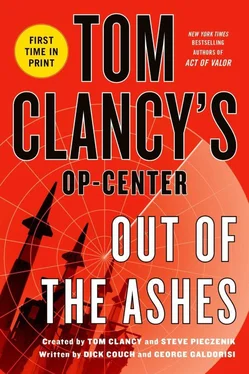“We do, Mr. President,” Secretary of State Patricia Green replied, “but this change in government in Syria, and particularly their hostility toward Saudi Arabia, is the worst possible scenario for us.”
“How bad is it?”
“It’s pretty bad, Mr. President,” Green continued. “Because of our long-term support for the Saudis, we’re getting the worst part of the guilt by association, and the Syrian government has now turned its venom on us.”
“I know all that,” Midkiff continued. “First Iran and Iraq, and now this. What are we doing about it? We can’t just let things spin out of control!”
“We are increasing our presence in Central Command area of responsibility as rapidly as we can, Mr. President,” Jack Bradt, his secretary of defense, reminded him. “General Albin is directing the build-up in-theater. We’re sending the Iranians and the Syrians, and everyone else for that matter, a clear signal that our interests in the Gulf are long term and that we’re prepared to defend those interests with military power.”
Actions were being taken to do exactly that. General Albin had already moved his command headquarters forward from Tampa, Florida, to his Joint Command Center in Al Udeid Air Base, Qatar. A host of forces, including the Truman strike group, were now in the Central Command area of responsibility.
“We’ve had pressure on the Iranians for a long time, Mr. President,” his national security advisor said, “and we’ll send a signal to the Syrians loud and clear.”
The president nodded that he understood.
“General Albin,” the secretary of defense said, directing his focus to the large screen display. “We want you watching the Syrians like a hawk. I don’t trust the bastards, and this isn’t going to be the next administration to get nailed by an attack on the U.S. of A. You tell us about any indications they’re gonna move against us and we’ll preempt that. Do I make myself clear?”
“Abundantly clear, Mr. Secretary,” Albin answered. “We’re using all the overhead imagery assets, principally satellites and UAVs, at our disposal to blanket Syria. It would be helpful, though, if we did have some more UAVs—”
“Great, keep up the good work, General. We’ll get you anything you need,” the secretary of defense interrupted as he turned and looked at the president. “Mr. President, we have our forces moving as quickly as we can. I think General Albin knows he has your full support.”
President Midkiff sat motionless and just nodded as he let the implications of what his advisors were telling him sink in. He recognized the gravity of the situation, but things were moving too fast.
Op-Center Headquarters, Fort Belvoir North, Fairfax County, Virginia
(March 16, 0815 Eastern Daylight Time)
Richard Middleton entered Chase Williams’s office for the early morning meeting wondering if there was a crisis brewing. Williams typically scheduled meetings well in advance and had a smooth, relatively predictable battle rhythm under way at Op-Center. Middleton had opened up his e-mail queue when he arrived at work that morning and found an e-mail from Williams asking to see him ASAP.
“Mornin’, boss. You wanted to see me?”
“Sure, Rich, come in.”
Middleton sat down, searching Williams’s face for clues. There were none. “Anything wrong?”
“No, and I didn’t mean to shake you up with an impromptu meeting, but I have been thinking about our conversation several days ago, the one where we discussed our support for the FBI’s Critical Incident Response Group. You were wondering how we might support them more, given your observations about the potential for another terror-for-hire attack here at home.”
“I’m glad you have, boss. The president’s given you a pretty broad mandate and now that we’ve got our Geek Tank cranked up I think we have a unique and valuable capability. I give Roger and his folks all the credit.”
As he sipped his coffee, Chase Williams thought about the relationship Op-Center had evolved with the FBI and the Critical Incident Response Group, the CIRG.
Op-Center’s relationship with their JSOC unit was one of direct operational control. This was something all concerned were comfortable with given Chase Williams’s extensive operational background as well as the military backgrounds of many of his core Op-Center staff. Williams could order his JSOC unit downrange and count on complete freedom of action.
Their relationship with the FBI CIRG was quite different, and there were strong reasons for that structure.
Americans were well accustomed to U.S. special operations forces working overseas in a covert manner and with the CIA operating in a covert, or even clandestine, manner. However, most U.S. citizens had a completely different attitude regarding what happened on American soil.
Having domestic forces under the full control of a shadowy agency such as Op-Center, no matter how well intentioned those leading Op-Center were, was not something most Americans were ready to support. Even if those actions would be designed to save American lives, that kind of freedom of action was something that moved well beyond the comfort level of most Americans.
So the Memorandum of Understanding, the MOU, between Op-Center, the White House, the Justice Department, and the FBI was crafted with great care. Boiled down to its essential elements, it stipulated that Op-Center would provide any intelligence it gained on international terrorists who could pose a domestic threat, as well as intelligence on any purely domestic threats, to the FBI Critical Incident Response Group. This notification would be made at the staff level and also by the Op-Center director directly to the attorney general or the FBI director. They, and only they, would direct the FBI CIRG to take action on American soil.
Middleton was worried this was not the most effective approach and he said so. “Boss, can you and the president revisit the relationship we have with the Critical Incident Response Group?”
“So you’d like us to have operational control of a CIRG element? Is that how I read what you’re saying? You know the sensitivities regarding action on American soil.”
“I do. Unfortunately, there is just too much at stake if the Justice Department can’t, or won’t, move fast enough. Shame on all of us if we don’t try to fix that.”
“I agree with you, Rich. You’ve laid out a good case. Test the waters with the FBI CIRG at your level and I’ll take it up with the FBI director. If we do our jobs right, they may be accepting of our proposal.”
* * *
Aboard Normandy, the watch teams had been at heightened alert ever since the ship passed through the Strait of Hormuz and entered the Arabian Gulf two days earlier. The dash across the Atlantic through a storm, through the Mediterranean, and through Suez and the Red Sea had been exhausting. The rough weather had taken its toll on people and ships alike. But morale aboard the ship had just hit bottom.
After evaluating the damage his ships had suffered during the sprint to the Gulf, the Truman strike group commander, Admiral Flynn, decided to pull most of his ships into port in the Gulf for badly needed repairs. Harry S. Truman had suffered the most damage, especially to many of her aircraft that had blue water crashing over them on her flight deck, and the ship was already pier side in Jabel Ali, near Dubai. Other strike group ships were in port in Bahrain and elsewhere.
Normandy was fortunate in that she had sustained the least damage, but it was a double-edged sword for the crew, as Normandy was assigned to remain at sea as the strike group’s air warfare and missile defense ship. Rumors were sweeping the ship that Captain Pete Blackman, eager to impress his boss, had volunteered to stay at sea while all the other strike group crews enjoyed just a bit of time ashore. Like many rumors on Navy ships, it was not true. In fact, given the heightened tensions in the Gulf, from an operational and tactical point of view, keeping Normandy at sea to defend the other strike group ships from missile attack made sense.
Читать дальше












